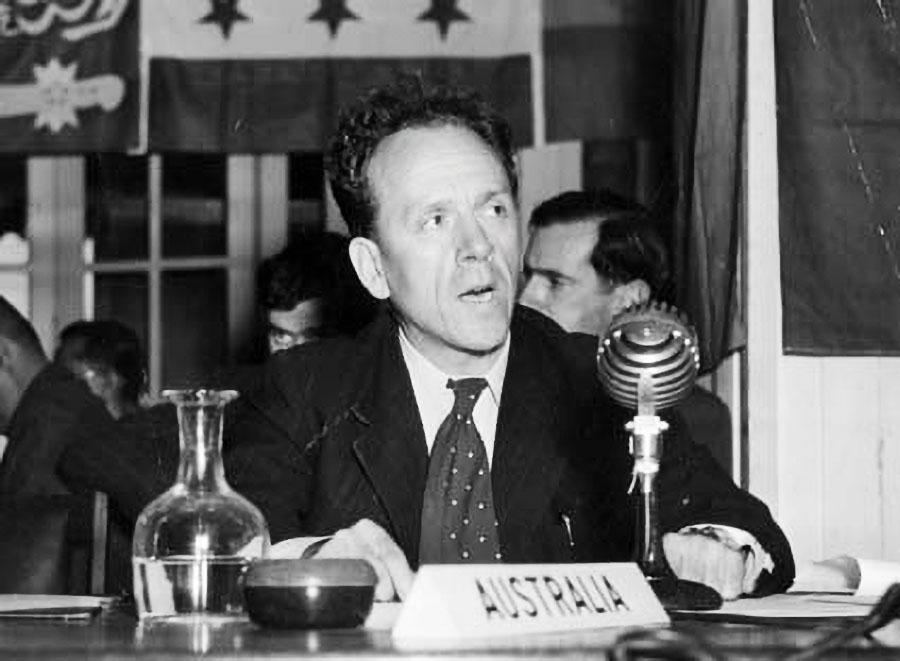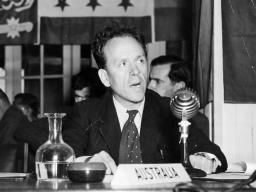
History
The H.C. Coombs Creative Arts Fellowship was established in 1964 at the instigation of Dr H.C. Coombs, ANU Pro-Chancellor at the time, to encourage creative work in the arts in Australia. Fellowships were filled by invitation rather than by public advertisement, and fellows selected by the Vice-Chancellor in consultation with an advisory committee. It was hoped other Australian Universities would follow the ANU example and establish similar schemes for the furtherment of creative artists. The fellowship has supported Australian artists such as Judith Wright, John Perceval, Arthur Boyd, Fiona Hall, Robyn Davidson, Amanda Lohrey, Melissa Lucashenko, Andrew Farris and Julie Gough. The invited fellowships are offered to visual and performing artists and writers on a rotational basis.
From its inception, the term creative artist was interpreted quite loosely, with musicians and architects being initially the only definite exclusions, and during the fellowship the University has hosted Don Burrows, Don Banks, Arthur Cantrill, Judith Clingan, George Golla, George Dreyfus, Alan Gould, Rodney Hall, Xavier Herbert, Christina Stead, Penny Tweedie and Clive Scollay, Judith Wright and many others. (View the full list). Visual artists have included painters, ceramists, printmakers, sculptors, tapestry-weavers, graphic-designers and artists interested in the use of scientific equipment and dynamic techniques.
Learn more about 50 years of the H.C. Coombs Creative Arts Fellowship
Guidelines
Purpose
- engage in a period of uninterrupted creative work in residence at the Australian National University, to conduct research and develop new ideas
- contribute to the fostering of the creative arts within the University
- interact with the University academic community, staff, students and visitors.
Eligibility
Applicants may be engaged in any discipline in the creative arts such as visual arts, contemporary craft or decorative arts, music, film/video production, acting, dance, theatre, writing, poetry, contemporary design or the creative use of new media technologies. To ensure that each area of the arts is equally represented by the Fellowship, a three-year cycle has been nominated as follows:
- 2019 Writing (including literature, prose, poetry, script writing)
- 2020 Cancelled due to global pandemic
- 2021 Visual Arts (postponed until 2022 due to global pandemic)
- 2022 Visual Arts (including visual arts, new media film & video)
- 2023 Writing (including literature, prose, poetry, script writing)
- 2024 Visual Arts (including visual arts, new media film & video)
- 2025 Performance (including theatre, music, dance)
- 2026 Writing (including literature, prose, poetry, script writing)
The Fellowship is intended for mid-career or well-established artists with recognised professional standing in their community.
Applicants will be Australian citizens, have formal residency status in Australia, or have a strong Australian connection sufficient to demonstrate that the benefits of the Fellowship will contribute to the development of Australia’s contemporary culture.
The Australian National University is committed to the promotion of equal opportunity for all persons, including women, people of Aboriginal and Torres Strait Islander descent, people of all racial and ethnic groups and people with disabilities.
Tenure
The Fellow is expected to be in residence at the University for a maximum of five months. At least half of the time will be during teaching periods.
Performance artists, and others for whom professional practice precludes long-term continuous residency, should demonstrate how shorter or intermittent residency periods will achieve the purpose of the Fellowship.
Funding
The Fellowship is up to $33,000, which is intended to cover accommodation, travel, living expenses and material costs (associated with the Fellow’s particular discipline). Funds must be spent in the year the Fellowship is undertaken and funds will not be carried forward into the following year. Depending upon the area of practice and individual requirements, the Fellowship will offer study or studio facilities at the University to the recipient. In some cases, these may need to be shared in some form with other practitioners. For applicants proposing intermittent periods of residency, their applications should contain a proposal of how the available funding will be structured to enable their Fellowship to proceed.
In-kind or other assistance may be available from the University for public programs in which the Fellow is involved: e.g., performances, exhibitions, seminars, public meetings, or workshops. Depending upon the financial requirements of the selected Fellow, a second Fellowship, possibly for a reduced tenure period, may be awarded in any calendar year.
The Advisory Committee
The H. C. Coombs Creative Arts Fellowship is administered by the Research School of Humanities & the Arts (RSHA) and managed by the RSHA Executive Committee. This Committee is chaired by the Director RSHA. Two independent experts may also be consulted.
Application Process
1. The Committee actively consults widely with university colleagues seeking their interest to nominate appropriate fellows for the Fellowship. The nomination will reflect the proposed areas relevance to the three-year cycle.
2. Nominations must be supported by an academic unit of the University in addition to the Research School of Humanities & the Arts. Written nominations should be submitted by the nominating academic unit of the University on behalf of the nominated person.
3. Applications can only be received from an ANU academic staff member or a hosting area (the nominator).
Proposals to be developed by the nominator must include the following:
- Nominate the artist (CV to be attached)
- Indicate the contact person (nominator) who agrees to undertake the organisational responsibilities in hosting the Fellowship with the Research School of Humanities & the Arts.
- Describe the facilities available and academic colleagues who may be involved with the Fellow (cross-University collaboration encouraged)
- Indicate the extent of interaction with the University community and any other connections expected to be made
- Outline the proposed creative arts program and its duration
- A statement from the Head of the hosting School or Centre outlining how the proposed Fellow will contribute to the activities and strategic goals of the School or Centre
- Outline of the budget proposed (accommodation, travel, living expenses, material costs)
- Provide an indication of the likely developments or outcomes of the residency, including legacy contributions to the ANU
- Fellows will be in the nominating area with office space arrangements determined by the nature of the Fellow's practice. Upon selection the fellowship process will follow the ANU Academic titles conferral policy.
An acknowledgement of receipt of the nomination will be sent to the artist.
Attention: Executive Assistant to the Director
Director’s office, G13 AD Hope Building, 14 Ellery Crescent
Research School of Humanities and the Arts
Australian National University, ACT, 2601
For further information please contact:
rsha.ea.cass@anu.edu.au
T: (02) 6125 4829
Selection Criteria
Fellowship proposals will be assessed by the H. C. Coombs Creative Arts Fellow Advisory Committee in terms of:
- the quality of the proposal contribution to the life of the University and its activities the capacity of the proposed Fellow to execute their proposal
- artistic standing of the proposed Fellow.
Other considerations:
- Demonstrated and active support and infrastructure available from the University academic area interested in hosting the Fellow
- Quality of the proposed creative work program and its potential for visibility and engagement with the University community, including coursework and PhD students and members of the broader community
- Potential for contact and collaboration with other parts of the University and the community
- Feasibility of the program.
The University reserves the right not to award the Fellowship in a particular calendar year.
Acquittal
The Advisory Committee requires a written report providing an account of activities during the Fellowship, outlining the benefits of the residency. Other comments and recommendations on ways in which the Fellowship can be improved within its existing limits for the benefit of future Fellows are welcome.
This report should be completed by the Fellow prior to leaving the University and at the completion of the residency period. Final Fellowship payments will only be paid to the Fellow upon the University’s receipt of this Report.
